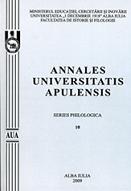La description d’un article lexicographique: le mot «joie»
Lexicographic description of the word: «joy»
Author(s): Oana Maria PăstaeSubject(s): Language and Literature Studies
Published by: Universitatea »1 Decembrie 1918« Alba Iulia
Keywords: joy; lexicography; dictionary; macrostructure; microstructure
Summary/Abstract: The aim of this work is to outline the lexicographic description of the concept of JOY by comparing the paper dictionary Le Nouveau Petit Robert 2008 with the electronic dictionary Le Petit Robert Electronique and Le Trésor de la Langue Française Informatisé. We try to analyze the various models of articles mentioned in these dictionaries regarding their disposition, presentation of words and entries, the so-called macrostructure, and then the different information that make up the article (definition, examples, grammar, phonetics, etc.), the so-called microstructure. First, we will analyze the concept of joy in TLFi, then we will do the comparison with the other two dictionaries and finally we will explain the advantages and disadvantages of computerization. In conclusion we could say that according to the five major criteria used in analyzing dictionaries (type of description, number of languages described, quantitative and qualitative richness of nomenclature, lexicographic corpus, synchronic and diachronic status) the three dictionaries are monolingual dictionaries. Regarding the nomenclature which corresponds to all entries in a dictionary, the TLFi is a Thesaurus, and the other ones are general dictionaries. If we analyze the corpus of the dictionary we could notice that the corpus of TLFi reflects the literary uses of language while other dictionaries- PRE and Petit Robert 2008 - present a closed corpus focused on phrases and examples. While traditional dictionaries are focused on competence of their users, today dictionaries are focused on their performance. Lexicographical inventions lead to new dictionaries, manufactured with the help of corpus. I think the paper dictionary still has some time to live but finally it will be replaced by the electronic and online dictionaries. In any case, there is a future for lexicography and terminology because more modern and attractive means for self-teaching will occur.
Journal: Annales Universitatis Apulensis. Series Philologica
- Issue Year: 10/2009
- Issue No: 1
- Page Range: 335-350
- Page Count: 15
- Language: French

